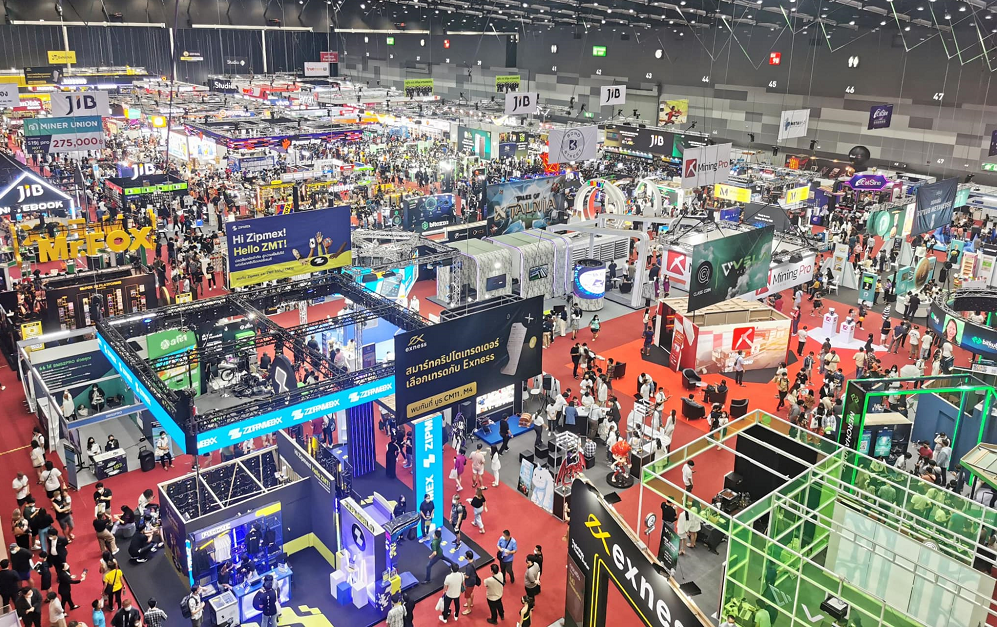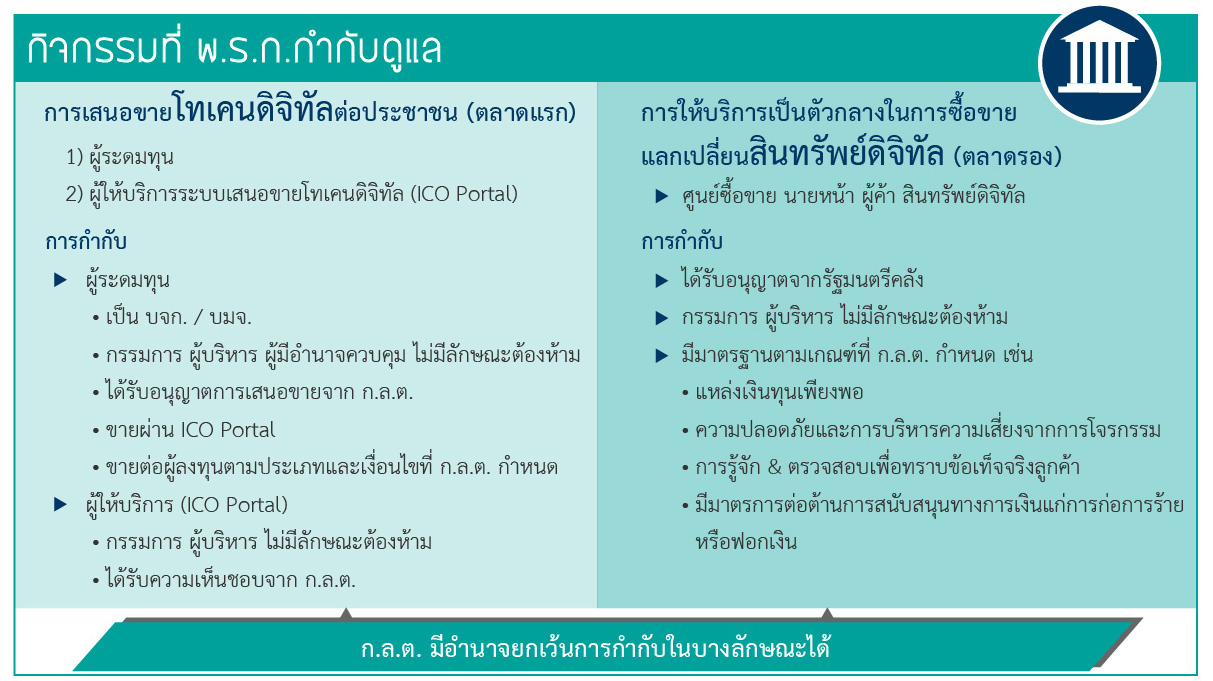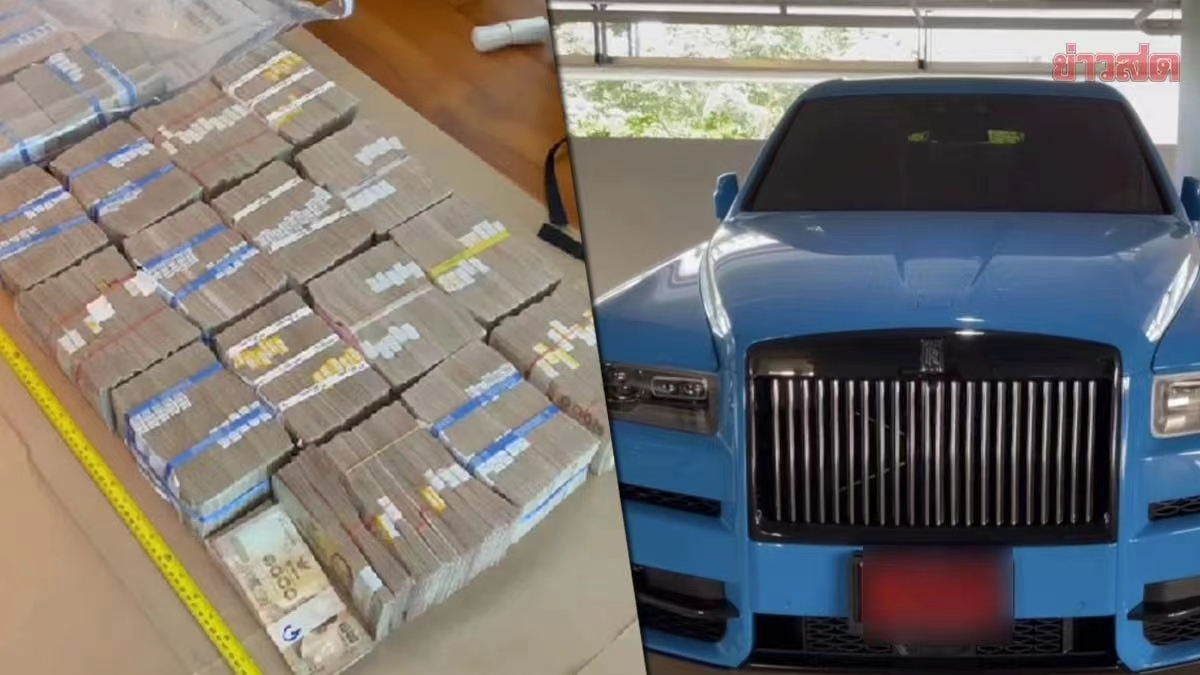Bangkok Web3 Experience: Digital Nomad Paradise or Chaotic Gray Production Base
Bangkok, a charming city. Due to its unique cultural atmosphere, exotic scenery and not far distance from China, it has become a very popular tourist destination for Chinese people.
Due to various reasons, Bangkok, a city with a blend of Eastern and Western cultures and a very international flavor, has also become a preferred destination for Web3 digital nomads. The cost of living here is reasonable, it provides a livable living environment for homeless people, and it is closely connected with the economic activities of the world market. A large number of international organizations and some multinational companies have set up their regional headquarters in Bangkok, and ESCAP, a subsidiary of the United Nations, also moved its headquarters in Shanghai to this place in the last century.
Although Thailand is still a developing country, Bangkok, as one of the most economically dynamic cities in Southeast Asia, is undoubtedly attractive to crypto practitioners. How is Thailand's encryption industry developing? How active is the trading market? Are there any large-scale Web3 communities and developers? What is the regulatory environment? What is the current situation of Chinese homeless living in Bangkok?
secondary title
Active market with high crypto adoption
Thailand is in a special position in the crypto market in Southeast Asia. It lacks the strong capital support of Singapore and Hong Kong, but has a certain degree of encryption foundation.
From the perspective of industry, Thailand's encryption industry has offices opened by multinational encryption agencies from the Western world; there are also Chinese entrepreneurs from the Chinese-speaking world; there are also more decentralized developers and vagrants from all over the world. Serving decentralized teams; what is even more indispensable are local projects that focus on the local market, including some large local companies that are compliantly registered.
There are large differences in the main market, working language, and organizational structure among various encryption practitioner groups. Just like Bangkok, a magical city that blends East and West,Thailand's encryption practitioners are also in a complex state of localization and internationalization.
In terms of crypto acceptance, research by cryptocurrency tax software company Recap shows that Bangkok has become the 10th largest cryptocurrency hub in the world. The firm’s research also shows that Thailand has the second-highest cryptocurrency ownership rate in the world.
The survey conducted by Kaitai Bank, one of the four major banks in Thailand, also showed that more than 90% of the samples said they had some understanding of cryptocurrencies. However, there is a certain deviation in the sampling group of this sample, all of whom are white-collar workers in Bangkok. According to research by market research firm Merchant Machine, Thailand has the fifth-highest encryption adoption rate in the world.
According to the regulatory requirements of the Thai SEC, the use of cryptocurrencies as a payment method has been banned since April 2022. However, it does not affect the enthusiasm of Thai people for investing in cryptocurrencies.

From the perspective of the overall environment, the Thai market is undoubtedly a tolerant and interested atmosphere for encryption.
Currently, Thailand is in the midst of a general election, and cryptocurrency adoption has even entered the campaign arena in an interesting form.
In April this year, one of the candidates for prime minister, Sretha Thavisin, announced the launch of the "one person, ten thousand plants" plan. Sretha Thavisin is the candidate for prime minister of the Pheu Thai Party. If she is elected and forms a new government, 10,000 baht in digital currency will be distributed to citizens aged 16 and above. This amount can be spent within a radius of four kilometers from the registered address on the ID card. And based on this digital currency, there are also a series of other blockchain-based initiatives, including attracting international digital currencies, encouraging exports and local economic stimulus plans, etc.
secondary title
The security environment may be the biggest disadvantage of Chinese homeless people
Recently, crimes in Thailand have frequently become hot spots on the Internet, and Thai tourism has also been hit hard in the Chinese market. For digital nomads living abroad, security is a topic that cannot be overemphasized.
Thailand's social security is quite safe, as evidenced by the long-term presence of digital nomads from all walks of life from all over the world.Moreover, Thailand has the environment and soil to engage in the encryption industry, and it seems to be an excellent choice for encryption nomads.But for Chinese homeless people, the living environment has become more complicated.
The so-called "waist-cutting" crime, which is almost like an urban legend, has already had various rumors and in-depth reports. Such urban legends are almost nonsensical, so I won't repeat them here. But another safety factor that is out of the public eye has to be taken seriously——Chinese to Chineseofpremeditatedcrime.
Take the past two months as an example:
On March 10, four fake policemen kidnapped a Chinese man and his Thai female translator in Bangkok. The victim's son transferred 30,000 USDT to the kidnappers through imToken.
On March 18, three Chinese citizens kidnapped a 23-year-old Chinese female student in Thonglor, Bangkok. After the victim transferred 50,000 USDT to the culprit's address, the culprit deleted the imToken from the victim's phone. In the end, the kidnappers extorted a total of about 3.2 million baht (about 94,000 U.S. dollars) in cryptocurrency and legal currency.
On March 20, a Chinese woman was kidnapped by Chinese criminal gangs while picking up her child in Pattaya. The kidnappers extorted 1 million RMB from her family.
On March 28, a 22-year-old Chinese female student was kidnapped by three men from Hebei Province in Nonthaburi Province, and then killed and dumped her body.
On April 14, a Chinese man suspected of defrauding in China was abducted by his Thai girlfriend and his cheating partner in his residence, and a ransom of 3.9 million (approximately US$114,000) baht was extorted.
On April 16, a Chinese citizen was kidnapped from a hotel in Bangkok's Sathorn district, and the kidnappers demanded a ransom of 1.8 million baht (approximately US$53,000).
image description
……

(In the Thonglor kidnapping case, the gangsters blatantly kidnapped the victim into a Toyota Alfa in the downtown area)
And this may be just the tip of the iceberg. There may be a large number of "black eating black" cases that have not been reported to the police, let alone the attention of the news media.
The stable currency USDT can be seen in a large number of vicious crimes.In Thailand, crypto adoption is not only high among ordinary residents, but it is undoubtedly even higher among criminals and crime victims.Why?
There are a lot of black funds in illegal industrial parks from Laos, Myanmar, Cambodia and other places. A large amount of funds are in a fast and uninterrupted nearly 7 x 24 non-stop flow between the mainland and Southeast Asia, RMB and foreign exchange, legal currency and virtual currency. Here, anyone can easily find an underground bank to convert USDT into legal currency, and thanks to Thailand's internationalization and relaxed regulatory environment, it can also be converted into almost any kind of legal currency. Even going a step further, real estate can be purchased with large amounts of cash banknotes.
The bosses and executives of illegal industrial parks in many Southeast Asian countries will naturally not stay in these underdeveloped countries after they become rich. As a quite livable and prosperous city in the region, Bangkok has become their best paradise.
It is difficult for us to ascertain the identity of the victim, but it is reasonable to speculate that the encryption adoption rate of the Chinese community in this region is much higher than the world average.
For digital nomads, fluent Chinese and East Asian faces are proof of identity. An old expatriate who has lived there for a long time thinks, “It means you are a walking ATM.”
Whether you are a law-abiding resident or not, the label of the black rich has become a stereotype of the Chinese sojourner thanks to the size of the Chinese outlaw community. And for those real Chinese black people, Chinese sojourners often represent the best audience for criminal activities, or even "black eating black".
Generally speaking, the crimes of "China vs. China" usually follow the following behavior pattern: the victim is exposed—is listed as the target of the crime—set up a situation to approach—commits the crime.
For example, in the blatant kidnapping case in downtown Thonglor, the criminal gang included a best friend who had known the victim for more than a year. In the case of the kidnapping and dumping of female overseas students, the criminal gang has also been dating the victim online for a year.
"Chinese", "Cryptocurrency", "Sojourner"...These labels are dangerous for crypto nomads. Fortunately, many recent cases have gone through a long period of lurking and disguise, which is the so-called "crime committed by acquaintances". Random crimes against China without a target are still extremely rare even in Thailand.
For the Chinese digital nomads in Thailand, this has brought them into an embarrassing and tangled situation: it is difficult to distinguish compatriots who speak Chinese with you and are familiar with encryption,Whether it is an encryption practitioner or a long-planned potential criminal.secondary title
Strong localization of the encryption market
Let’s talk about the current situation of the Thai encryption market in detail. The Thai encryption market has many unique and interesting characteristics.
image description

(Native Exchange Advertisement next to the Victory Monument)
Thailand has already had local market players. Founded in 2018, Bitkub, a cryptocurrency exchange, was founded by Jirayut Srupsrisopa, a Thai-Chinese.
According to CoinMarketCap's ranking, BitKub currently ranks 61 overall among all exchanges. And its daily trading volume (take today's data as an example) is in the tens of millions of dollars.
Judging from the numbers,Its amount is really difficult to compete with China's second-tier and third-tier exchanges.It is even more difficult to compete with international firms. For a regional market, this is still a good result.
As one of the first exchanges registered with the Thai SEC, Bitkub's influence and brand power in Thailand are not lost to Binance.According to statistics, Bitkup’s market share in Thailand was as high as 90%.However, in view of the statistical difficulties of compliant platforms and non-compliant platforms in terms of data coverage,The authors of this article have reservations about this data.
And in 2021, Thailand’s Anti-Money Laundering Office updated KYC requirements. Local compliance exchanges are prohibited from creating accounts online, and Thai citizens can only verify their identity information on the spot. This is a major blow to local compliance exchanges.
As the most well-known compliance exchange in Thailand, Bitkup has since slowed down its momentum. But still at the end of 2021, the acquisition negotiations with Thailand’s most well-known bank, Siam Commercial Bank (SCB), were completed, and SCB announced that it would acquire a 51% stake in digital currency exchange Bitkub for 17.85 billion baht.
secondary title
Shortage of capital, dependence on consortium funding
SCB’s acquisition of Bitkup has long been terminated, but its impact on the Thai crypto market continues.
Siam Commercial Bank (Siam Commercial Bank) is a very influential bank in Thailand. It was established by the royal family in 1906, and it is involved in a wide range of economic activities. This also reflects another characteristic of Thailand's encryption market-high reliance on large local banks.
Thailand is not a capital highland like Hong Kong and Singapore, and it is difficult for many entrepreneurs to obtain capital support. If it cannot be favored in the international market, it can only hope for large local banks with capital in hand. Taking SCB as an example, the acquisition of the mature project Bitkup (although it failed to materialize in the end) reflects its determination to enter the encryption field, and SCB also has a layout on the startup incubation side.
SCB has already established SCB 10X, which focuses on the encryption market, which is both an early project incubator and a venture capital fund. And its investment scope is not limited to the local market, but also frequently sells in the world market.Currently, SCB 10X investment projects include well-known projects such as The Sandbox, Nansen, ripple, BlockFi, and Anchor.Since then, SCB 10X has also planned to cooperate with Charoen Pokphand Group (CP) to set up a venture capital fund with a scale of 600-800 million US dollars, focusing on investing in encryption fields such as blockchain, digital assets, and Web3.
And Kaitai Bank, one of the four major banks in Thailand, although it does not have a secondary company focused on the encryption field, its venture capital fund Beacon Venture has also made some gains in the encryption field. Its crypto investments include lending platform Alchemy, derivatives DEX platform Forward, crypto consulting service firm Cryptomind, and more.
Cryptomind, which Kaitai Bank invested in, is a more interesting company.
Cryptomind is a registered encryption broker and consultant in Thailand. Its products can provide customers with brokerage services, operate on behalf of them through centralized fund management, and earn DeFi income. But this is not what this article wants to focus on. Its consulting services are more interesting. On its official website, the company lists the Facebook pages of a group of cooperative KOLs, and the company operates an MCN-like encrypted content network. This is also the special feature of Thailand's encryption ecology.
In several countries in Southeast Asia, including Thailand, Facebook is an important source of information.secondary title
Already has a stable small developer community
Thailand's educational environment does not focus on science and engineering, which also leads to the fact that its liberal arts and business professionals are much larger than those of science and engineering, and its developer resources are relatively scarce.
But perhaps benefiting from Thailand’s unique international environment, as mentioned above, there are still some international encryption companies and a large number of foreign digital nomads. Digital nomad developers and other encryption workers can also be regarded as a group of practitioners that cannot be ignored in Thailand's encryption industry.
Crypto events in Thailand are popular, with several major crypto summits held in Thailand last year. Small development events and hackathons are held from time to time.At present, there are stable encryption communities and offline activities in Bangkok and Chiang Mai.
image description

(Crypto Expo Thailand 2022)
Currently, the Bangkok Blockathon organized by SCB 1 0X is being held in Bangkok. It is still in the project application stage and has not yet competed for a winner.secondary title
Dating Rich But Imperfect Encryption Legislation
For crypto entrepreneurs, the legal environment is perhaps the most important area of concern.
Thailand was one of the first jurisdictions in the Asia-Pacific region to introduce a specific “law” (explained below) for cryptocurrencies. Since Buddhist calendar 2561 (AD 2018), Thailand has launched a series of documents related to encryption regulation. Including the so-called "Digital Asset Law" and a series of supporting regulatory documents that were previously reported by the Chinese-speaking world were promulgated this year.
Due to the special periodicity and rapid change characteristics of the encryption industry, this series of "ancient" decrees from the previous cycle cannot well follow the current market trend. In the bull market cycle of 2021, Thailand's regulatory authorities will continue to follow up and improve relevant regulations on the basis of previous ones.
However, it is worth noting that Thailand’s encryption regulatory framework has certain particularities. The previously widely reported so-called "Digital Assets Law"(The accurate translation should be "Emergency Royal Decree on Digital Assets"), is not a common "law" in other market entities, but a "royal decree (พ.ร.ก.)". According to the Constitution, decrees do not need to go through the regular legislative process, and can be directly promulgated after being submitted by the cabinet to the king for signature. As far as the encryption legal framework is concerned, its legal foundation is not sound, and it is difficult to clarify regulatory details.
This has led to a dilemma in the Thai regulatory framework similar to other market players,That is, the problem of "Nine Dragons Water Control" style multi-headed competition for regulatory power.image description

(The "Royal Decree" clarifies the scope of supervision of the primary market and the secondary market)
According to the regulatory framework, the Thai regulatory authorities refer to this huge collection of encrypted assets as "Digital Assets".And subdivided into two categories of "Cryptocurrency (Cryptocurrency)" and "Digital Token (Digital Token)".
Specifically, "cryptocurrency" is intended to serve as a medium of exchange for transactions of goods and services, including transactions between digital assets. For example, BTC can be considered a cryptocurrency.
The "digital token" puts more emphasis on its investment attributes. The decree states that digital tokens refer to “the right to invest in a project or business, or to acquire specific goods, services or other rights in accordance with the agreement between the issuer and the holder.
Therefore, although they are both digital assets, cryptocurrencies and digital tokens have completely different legal statuses. In addition, an interesting little fact is that although the Thai decree calls it "Digital Asset", investors and practitioners in the encryption industry in Thailand are still more accustomed to using"Digital Currency"As a general term for encrypted assets, it is different from the more commonly used "Crypto" in the English-speaking world and the Chinese-speaking world.
At present, Thailand’s encryption regulatory activities are mainly concentrated in the Thai SEC. ThatThe scope of supervision includes trading platforms, token issuers, brokers, funds, etc.Almost all parties have adopted the registration system, and companies that have obtained legal registration will be announced on the SEC official website.
At present, 9 trading platforms including BitKub and Upbit have completed registration with the SEC, and 6 of them have obtained both cryptocurrency and digital token trading licenses.
In addition, compared with financial highlands such as Singapore, Bermuda, and Hong Kong, Thailand's encryption regulation is more focused on the local market. It is different from the above-mentioned regions that prefer to introduce large international institutions and companies, which focus on offshore regulatory frameworks.Crypto regulation for doing business in international markets is significantly behind.secondary title
Is Magic Tyrande still suitable for digital nomads?
In the stereotype, Thailand seems to be a cheaper place to emigrate, with rich food, sound medical conditions, high-quality service industry and all kinds of daily necessities. If you don't need to build a social relationship for work and entertainment in Thailand, if you are just a simple tourist, Thailand is still very safe and very interesting.
But for sojourn and tourism, although there is a word difference, the environment is completely different. Prices in Thailand are not cheap, and the Chinese social environment is far from safe, and the authorities' policies are even more complicated.
Surrogacy, fraud, gambling, money laundering...
image description

(The police searched and seized a large amount of cash and Rolls Royce owned by Chinese citizens involved in fraud)
Just recently, Thailand's visa policy is also changing rapidly. Quite a number of expatriates have been "accidentally injured", and it has developed to the point that almost all long-term visas except for studying abroad may be refused entry.
Bangkok, a city that is extremely attractive to the world's digital nomads, is gradually closing its doors to Chinese nomads recently. Whether the situation will improve in the future is still unknown.
This article is one of a series of reports on the Southeast Asian encryption market observation. Odaily reporters in Thailand will continue to track more market trends in Southeast Asia. Welcome to add the author WeChat (lift_example) to communicate in Thai Travelers and projects.



